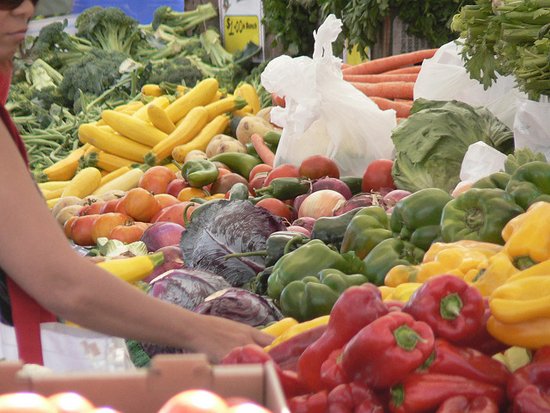
The antioxidants found in fruits and vegetables help fight free radicals, which can lead to breast cancer.
Free radicals are often mentioned as a cause of breast cancer, but what exactly are free radicals?
Free radicals are highly reactive and unstable molecules, usually oxygen molecules, but not always. Their unstable nature is caused by having an unpaired electron. As a result of this unpaired electron, free radicals seek out and take electrons from other molecules, which oftentimes causes damage to the second molecule. When a free radical molecule does this, it is called “oxidation.” A molecule that has had its electron “stolen” from a a free radical has been “oxidized.” Molecules that have been oxidized are now transformed into free radicals themselves and will seek to interact with another healthy molecule, thereby creating a vicious chain reaction of electron stealing in the body. When the body has undergone excessive oxidation, or more oxidation than can be combatted, it is said be undergoing “oxidative stress.”
Like many things that occur in nature, free radicals are not only impossible to avoid, but necessary for life. Free radicals help us fight infection, begin the inflammation process that helps repair tissue injury, and short-term oxidative stress may inhibit aging. At the same time, excessive amounts are harmful to humans.
How Do Free Radicals Form?
Free radicals can form in the body in a number of ways:
- Environmental exposure – Carcinogens like radiation from the sun, cigarette smoke, air and water pollution, pesticides and herbicides in the food we eat, asbestos and other nasties can cause free radical formation in our bodies.
- Exercise – While consistent moderate exercise has many positive benefits and can reduce the risk of breast cancer, excessive exercise or inconsistent but vigorous exercise uses a high amount of the body’s oxygen store and as a result, generates excessive free radicals.
- Stress – The chemicals cortisone and catecholamines created by mental stress can create free radicals.
- Our bodies – Free radical molecules are a natural byproduct of cell metabolism.
- Alcohol – Consumption of alcohol of any kind of any amount produces free radicals in the body.
- Fat – Polyunsaturated fat like that found in vegetables oils is easily oxidized in the body and can create free radicals. Substitute polyunsaturated fats with monounsaturated fat.
Free Radicals & Breast Cancer
Free radicals are thought to be one cause of cancer, as well as the cause of some auto-immune diseases, heart diseases, neurological diseases, and the aging process in general. In the case of cancer, it is believed that the interaction of free radicals with the body’s DNAThe part of every cell that carries out genetic information on cell growth, division, and function. can cause cell mutations which increases breast cancer risk. Oxidative stress has been shown to decrease apoptosis (the body’s natural method of controlling cell growth) and increase invasiveness, proliferation, and metastasisCancer cells break away from where they first formed (primary cancer), travel through the blood or lymph system, and form new tumors (metastatic tumors) in other organs of the body. of cancer cells.
How Antioxidants Combat Free Radicals
Antioxidants are molecules that can safely interact with free radicals. Unlike other molecules, antioxidants can donate an electron to a free radical and still remain stable, therefore stopping the cycle of cell damage. Antioxidants are often called “free radical scavengers,” as a result. Examples of antioxidants are:
- Beta carotene (vitamin A)
- Vitamin C
- Vitamin E
- Lycopene
How To Increase Your Antioxidant Intake
One of the best ways to reduce free radical damage in the body, and therefore decrease your risk of breast cancer, is to increase your intake of these vitamins. One of the best sources? Fruits and vegetables! Follow the USDA’s MyPlate food guidelines which say that 50% of your diet should be fruits and vegetables. Consider having one vegetarian day per week or even going completely vegetarian. Make your goal 5-8 servings of fruits and vegetables per day. If you are unsure what a serving is, check out our article Confused About the Serving Sizes of Vegetables? And if you’re looking for healthy veggie-centric recipes ideas, check out our recipe section.
Have you increased antioxidants in your diet? We’d love to hear your tips in the comments below!